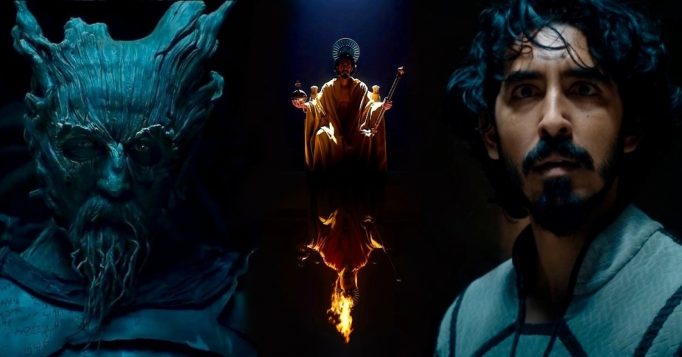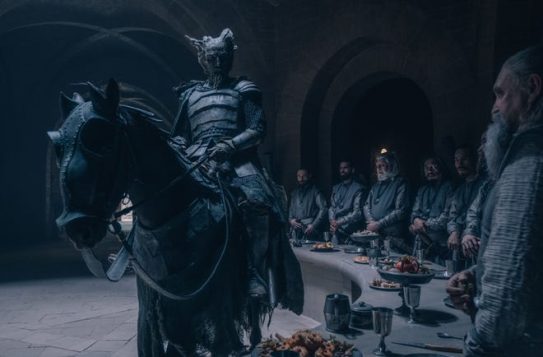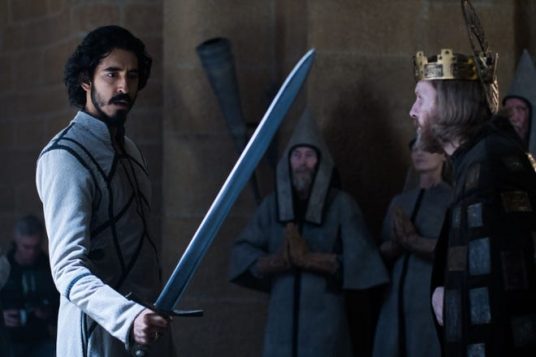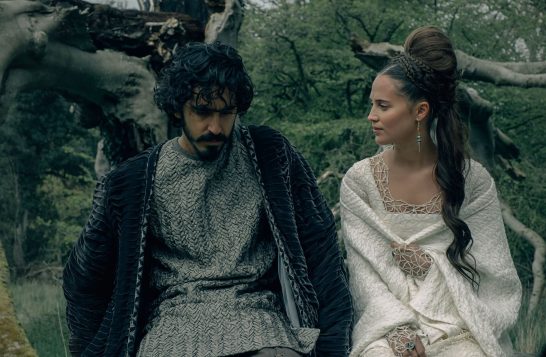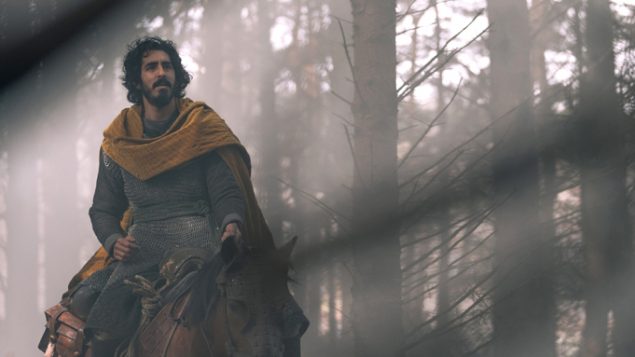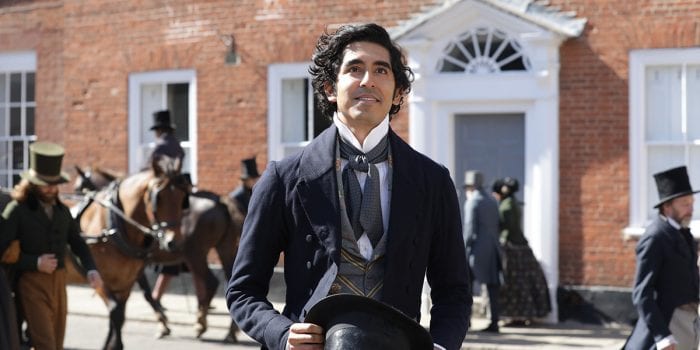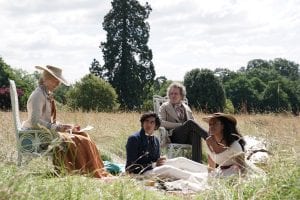Reviewed by Jeffrey Sanzel
The tales of King Arthur and the Knights of the Round Table have always been fair game for adaptation. Whether it is Mark Twain’s A Connecticut Yankee in King Arthur’s Court (1889), Lerner and Loewe’s Broadway musical Camelot (1960), or the gritty but entertaining film Excalibur (1981), the story has embraced (or at least stood up to) revisionism. As a result, the legends have endured over seven centuries, from The Sword in the Stone (1963) to Spamalot (2005).
The Green Knight loosely draws on the fourteenth-century poem Sir Gawain and the Green Knight and other sources. Knowledge of the story and history is not necessary to view the film. Clearly. David Lowery has written, directed, edited, and produced the film. So, he can be considered the responsible party.
Gawain (Dev Patel) awakes on Christmas morning in a brothel, having spent the night with Essel (Alicia Vikander). His mother, sorceress Morgan le Fay (Sarita Choudhury), sends him on his way to celebrate Christmas with King Arthur (Sean Harris) and Queen Guinevere (Katie Dickie).
Unbeknownst to Gawain, his mother performs a ritual, raising and sending the Green Knight to the feast where the tree-like titular lord issues a challenge: If anyone can land a blow on him, he will win his green axe. However, in exchange, the victor must meet the Green Knight on the following Christmas to receive a reciprocal hit. For some reason, Gawain, a bit of a slacker, volunteers. He decapitates the Green Knight, who then picks up his head and leaves. Sort of a hah-hah-see-you-next-Christmas.
Fast-forward a year. Gawain has become something of a celebrity; he is even featured in a puppet show. He sets off to the Green Chapel, and throughout, he encounters a handful of challenges, mostly unsatisfying blips. He also meets a fox who joins his journey. “The Quest” is a well-known, often-trod trope and can be exciting, engaging, and enthralling. Unfortunately, it can also be an epic slog into scenery, mumbled dialogue, and symbols. Oh, so many symbols. The Green Knight is full of meaning and “meaning” and meaning and MEANING.
One suspects that Lowery’s goal was a rumination on the nature of heroism and honor, with a few nods to the dangers of celebrity. But this is all lost in a meandering and pretentious narrative. There are a few dramatic strokes, but these do not add up to a film.
In the theatre across the hall, the sounds of The Suicide Squad could clearly be heard. Sitting at The Green Knight was like attending a lecture that you suspect might be good for you, but next door, there’s a barnburner where everyone is having a good time. “I’ll bet it’s fun over there,” you think. “But, no, this is going to make me a better and smarter person.” You have plenty of time to think these thoughts because, in The Green Knight, the pauses are longer than the dialogue. There are pauses and scenery. Lots of pauses. Lots of scenery. Then a monologue. Please note the singular: monologue. While there are multiple long speeches by various characters, they all sound like the same monologue. Followed by some pauses. And then some scenery.
The filming itself is impressive, highlighting the vast expanses of wilderness as Gawain travels towards his destiny. Cinematographer Andrew Droz Palermo has done beautiful work capturing the natural/supernatural world. But landscape only goes so far. In this case, it seems to go really, really far.
Dev Patel is a fine actor, and he does what he can. But he is offered the emotional range of dissipated to slightly less dissipated. The script’s Gawain is painfully passive; Patel ultimately struggles to show the character’s evolution. The rest of the talented cast is saddled with dialogue that is spoken in harsh whispers with a great deal of meaning and “meaning and … (One suspects the CGI-ed fox called his agent mid-filming to see if he could get out of his contract.)
The ending—one of the only brisk moments in the film—has been much discussed on the internet. Suffice it to say, the denouement owes not a little to t, the well-crafted story by Ambrose Pierce later made into a memorable short film.
As a public service and attempt to salvage the reader’s time, the balance of this review is given over to something of value. Here is the beginning of a recipe for a good vegan pound cake: Preheat the oven to 350 F. Grease a 9 x 5-inch loaf pan.
Rated R, The Green Knight is now playing in local theaters.

